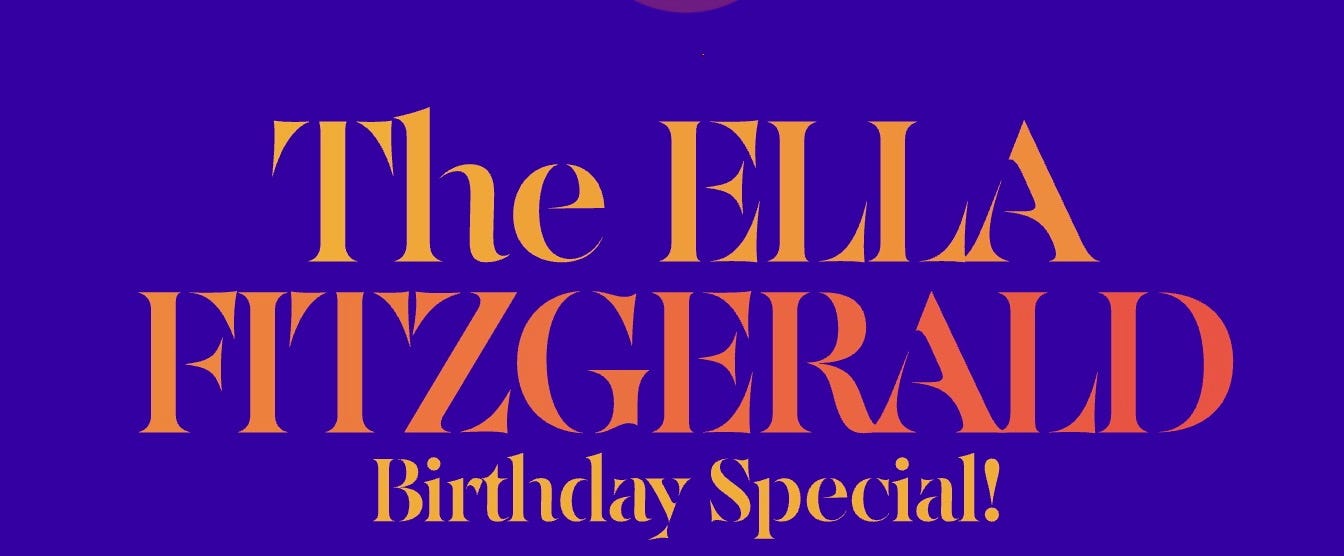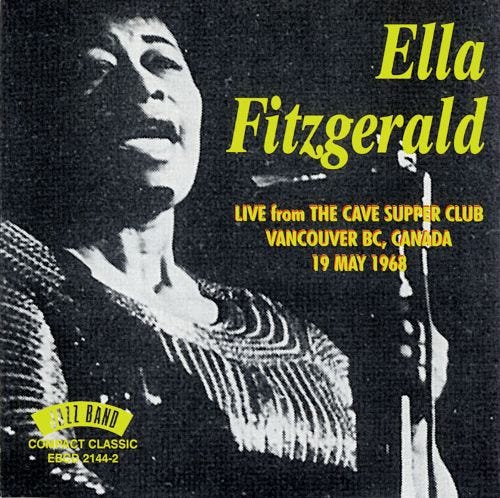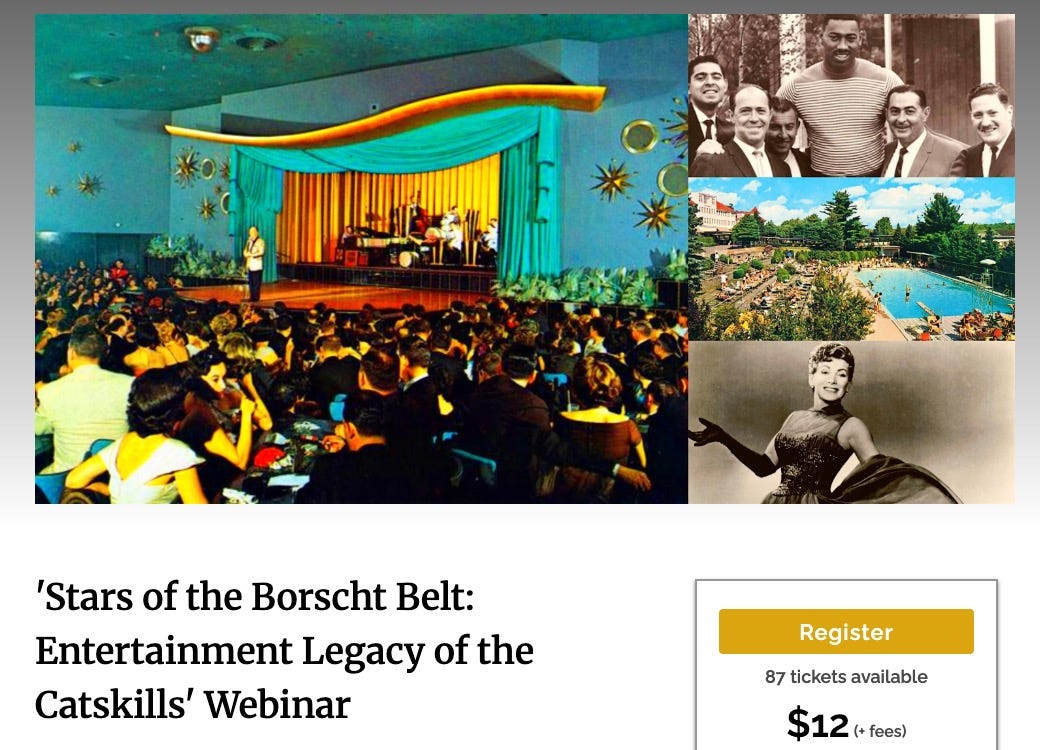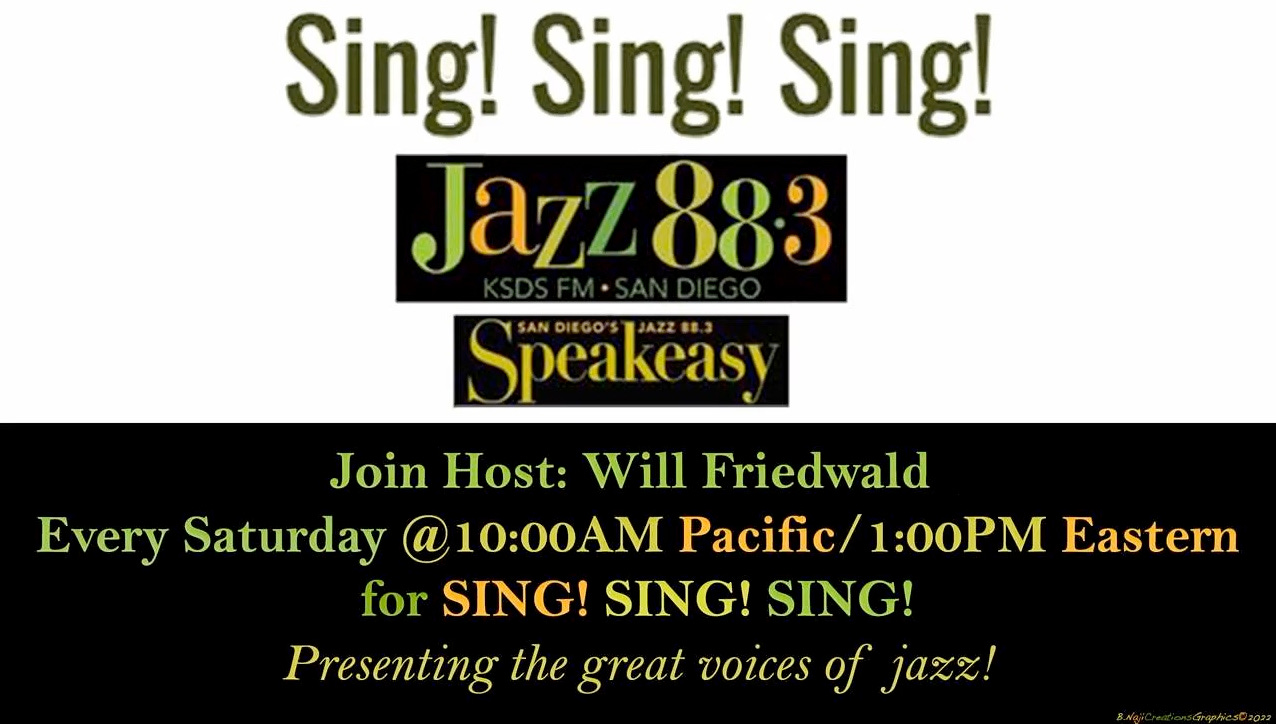One thing, out of many, that Judith Tick - latest and greatest biographer of Ella Fitzgerald - and I agree on is that Fitzgerald deserves more credit for her repertoire choices.
We also agree that it was her two major producers - first Milt Gabler, and then, to a much greater extent, Norman Granz - who deserve credit for the Ella Fitzgerald songbook series. This whole run is bookended by George Gershwin, starting with the sublime Ella Sings Gershwin (1950), building up to the epic Ella Fitzgerald Sings the George and Ira Gershwin Songbook (1959), and concluding with the underappreciated Nice Work if You Can Get It (1983). Along the way, there are roughly ten other composer-driven albums, including all eight of the classic songbooks created by Fitzgerald and Granz from 1955 to 1964 for Verve Records.
But as is well known, Granz’s sole interests lie in pure, unadulterated jazz - the smaller the group and the more overwhelmingly spontaneous the improvisation the better - and, to a lesser extent, in what became known as “the Great American Songbook.” He was perhaps the only producer running a commercial record label who had zero interest in hit singles. (He even went so far as to discourage Nat King Cole from singing, and somehow wasn’t ashamed to admit to that opinion 40 years later - so there!)
Which was both good and bad for Fitzgerald; in the long run, what she’s best known for is the songbooks and hundreds of other standards that she sang and recorded. As Tony Bennett liked to say, “Ella didn’t have hit singles - she had a hit catalog, in which every song was great.”
But Fitzgerald’s own opinions, dreams, and desires weren’t always completely in sync with her producer / manager / rabbi. In fact, it was the give-and-take between the two that helped to make her canon so unique and memorable. From the very beginning, she loved current popular songs, whether she was offering her own version of a current King Cole Trio hit like “It’s Only a Paper Moon” (1945) or “The Frim Fram Sauce” (1946) to songs by the Beatles 20 years later. She always found something to love and inspire her on the Billboard pop charts.
In honor of Ella’s birthday month (she’d be 108 on April 25) we’re going to look at some of those contemporary pop songs that Ella loved, the majority of which she never formally recorded in a studio, but almost all of which were captured in live concert recordings, some issued in her lifetime, but most released, officially or otherwise, in the last 25 years.
“Singing the Blues”
(aka “You’ve Got Me Singing The Blues”)
(Melvin Endsley)
Ella clearly loved this song, and sang it at several concerts in 1957, the best known of which is from Stockholm in April 1957. This is the opening number from Ella’s segment of a Jazz at the Philharmonic concert that also includes Oscar Peterson, Roy Eldridge, and Stuff Smith. (Alas, they don’t play on this particular number.)
For much of the history of recorded music, there was a long history of multiple artists recording the same material - the most clear cut example is the 1951 classic song, “Cold, Cold Heart.” Hank Williams cut the original version of his own song for the country and western market, Tony Bennett cut a massive hit version for the general pop market, and Dinah Washington gave us a no-less classic version for the Rhythm-and-Blues market - these two terms being euphemisms for white and Black listeners.
“Singing the Blues” was almost a parallel situation. It originated in the country market as a song by Melvin Endsley, who wrote several other notable tunes but enjoyed no other major “crossover” hits, and was first recorded by Marty Robbins, one of the great crooners in any genre. Next, there was a mainstream pop version by Guy Mitchell, a versatile baritone who essentially connected the genres of big band and country. If Ella had still been on Decca in 1956, I have no doubt that Milt Gabler would have had her record this - which would have been for the jazz and Black audience, even though Ella was already beloved by everyone by this time.
This would have delighted her. She not only sings “Singing the Blues” with uncommon energy even by her own high standards, but she’s worked it into one of her own arrangements, which detours through “Blues in the Night” and then concludes with an original coda with new words obviously by Ella herself:
I really goofed!
I missed my cues!
And now you’re gone,
I’ll have to pay these dues,
Baby - You’ve got me singing the blues!
“These Boots Are Made for Walkin’”
(Lee Hazelwood)
Knowing Nancy Sinatra - whom fans affectionately refer to as “Boots” - she would certainly have been thrilled and honored that her signature song was picked up by Fitzgerald. Ella sang it in the 1967-68 period, and recorded it on a very obscure single on the Stateside label (which we shared a few months ago) and her own Salle Records (“Ella’s” spelled backwards) label. She sang “Boots” on her early 1968 tour with Duke Ellington, including this concert at the Salle Pleyel. This is an outstanding chart by her musical director Jimmy Jones, not least because it doesn’t contain any hint of the famous descending bass line. The Fitzgerald / Jones / Ellington version is funky and upbeat and Ella really tears into it, opening with more original lyrics by the singer, this time as an introduction.
Hey, mister, hey mister,
I need a pair of shoes,
Those big ones, those big boots,
To walk away my blues.
In her coda, she gets even more feisty and vituperative: she doesn’t just tell her boots to “walk,” she yells out, “Boot him, Baby, boot him - the dirty rat!” “Kick him, boots, kick him!” Ouch!
“Music to Watch Girls By”
(Music by Sid Ramin | Lyric by Tony Velona)
Much like “Wives and Lovers,” which Fitzgerald also sang with considerable enthusiasm, this is a song that probably wouldn’t fly today - at least the lyric wouldn’t. The same is true for lyricist Tony Velona’s other hugely popular song, “Lollipops and Roses,” the Jack Jones hit. And just as Jones himself wrote a response lyric to “Wives and Lovers” (from a feminist point of view), there was a follow-up to “Music to Watch Girls By” from fifty years later titled “Music to Watch Boys To” by Lana Del Rey in 2015.
Gender politics notwithstanding, who doesn’t love this song? For some reason, I always thought that it was by Burt Bacharach, although neither the tune nor the words are up to the high standards of Bacharach and Hal David. And I also thought that the instrumental version was by Herb Alpert, although I may be forgiven for that, since the Bob Crewe hit single even today sounds like “The Tijuana Brass - Lite.”
The newly-released Oakland concert contains Ella’s major version of “MTWGB,” and, to my surprise, she also performed the song at a Berlin concert circa 1968 (see video above) and at the Cave Supper Club in Vancouver that same season.
“Girl Talk”
(Music by Neal Hefti | Words by Bobby Troup | from the film Harlow)
Thus it has come to pass that now, with “Wives and Lovers” and “Music to Watch Girls By,” we have a trio of what would be considered chauvinistic and decidedly un-PC songs by Ella Fitzgerald. In fact, there’s enough for a “misogyny medley,” or even a very short album titled Songs for Swinging Sexists.
“Girl Talk” is listed on the CD with the long title Ella Fitzgerald with The Fraser MacPherson Big Band & The Tee Carson Trio – Live from the Cave Supper Club Vancouver BC, Canada, 19 May 1968, issued on Ed Burke’s Jazz Band label in 1999. However, when we play the track, it actually turns out to be mistitled; instead this is, surprisingly, another live performance of “Music to Watch Girls By,” perhaps an even more exciting performance, with the fine Manitoba-born multi-instrumentalist Fraser MacPherson conducting his full-sized swing band as the house band at the Cave Supper Club in British Columbia.
However, Fitzgerald did get around to “Girl Talk” for Speak Love, her 1983 album of voice and guitar duets with the brilliant guitarist Joe Pass. Her collaborations with Pass were among the highlights of her later career, and this one is even more playful than most. Fitzgerald doesn’t do anything halfway, and this interpretation has her doubling down on the inherent sexism rather than avoiding it. She interlaces the lyrics with literal “cat calls,” in the form of meows. Other than that, the vocal is warm and intimate, semi-slow until the second chorus, in which she increases the speed and starts injecting more of a backbeat into the proceedings. She ends with another few meows, and by now they seem cute rather than anything else. (For the sake of comparison, Betty Carter included a rather more ironic version of “Girl Talk” on her 1969 live album Finally, Betty Carter.)
PS: Highly Recommended: The best-ever Ella Fitzgerald Discography, as compiled by the late Michele Scasso with considerable help and input from the mighty Steve Albin. Accessible here!
Coming soon:
Ella sings Mondo Broadway (including Chicago & The Wiz)
Ella Sings the Beatles
Ella Sings the Burt Bacharach Songbook
(Very special thanks to Elizabeth Zimmer & Dan Fortune for their expert proofing, hey!)
Coming on Wednesday April 16, THE NEW YORK ADVENTURE CLUB presents STARS OF THE BORSCHT BELT: ENTERTAINMENT LEGACY OF THE CATSKILLS (All presentations are available for replay viewing for one week after the live event. For more information & reservations, please click here.)
Sing! Sing! Sing! : My tagline is, “Celebrating the great jazz - and jazz-adjacent - singers, as well as the composers, lyricists, arrangers, soloists, and sidemen, who help to make them great.”
A production of KSDS heard Saturdays at 10:00 AM Pacific; 1:00PM Eastern.
To listen to KSDS via the internet (current and recent shows are available for streaming.) click here.
The whole series is also listenable on Podbean.com; click here.
SING! SING! SING!
Religion In Rhythm - Book 3
(SSS #143 2025-04-12)
download: <or> play online:
April Fool's Day Special - Great Jazz Novelty Songs
(SSS #142 2025-04-05)
Download: <or> play online:
Female Songwriters of the Swing Era part 2 w Professor Michael G. Garber
(SSS #141 2025-03-29 Women's History Month)
download: <or> play online:
Female Songwriters of the Swing Era Part 1 w Professor Michael G. Garber
(SSS #140 2025-03-22 Women's History Month)
download: <or> play online:
The NAT KING COLE birthday Special - Nat & Nelson swing the Standards
(SSS #139 2025-03-15)
download: <or> play online:
Ella Fitzgerald: "Ella's Race Problem" with Judith Tick
(BLACK HISTORY MONTH 2025-02-24)
download: <or> play online:
Nat King Cole: "We Are Americans Too" (“Assault on a King”)
(BLACK HISTORY MONTH 2025-02-18)
Download: <or> play online:
THE REAL AMBASSADORS with special guest Ricky Riccardi
(Black History Month 2025-02-17)
download: <or> play online:
SLOUCHING TOWARDS BIRDLAND is a SubStack newsletter by Will Friedwald. The best way to support my work is with a paid subscription, for which I am asking either $5 a month or $50 per year. Thank you for considering. (Thanks as always to Beth Naji & Arlen Schumer for special graphics.) Word up, peace out, go forth and sin no more! (And always remember: “A man is born, but he’s no good no how, without a song.”)
Note to friends: a lot of you respond to my SubStack posts here directly to me via eMail. It’s actually a lot more beneficial to me if you go to the SubStack web page and put your responses down as a “comment.” This helps me “drive traffic” and all that other social media stuff. If you look a tiny bit down from this text, you will see three buttons, one of which is “comment.” Just hit that one, hey. Thanks!j
Slouching Towards Birdland (Will Friedwald's SubStack) is a reader-supported publication. To receive new posts and support my work, consider becoming a free or paid subscriber.








Incredibly wonderful
Will,
This is simply marvelous stuff. (FYI - Her R&B take of The Marcels' version of "Blue Moon" is another bit of the Ella pop song story.)
You write so very well about this stuff we all owe you a debt.